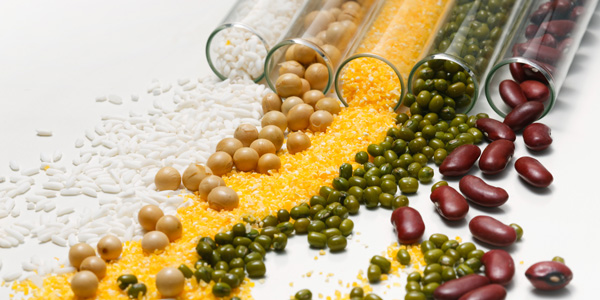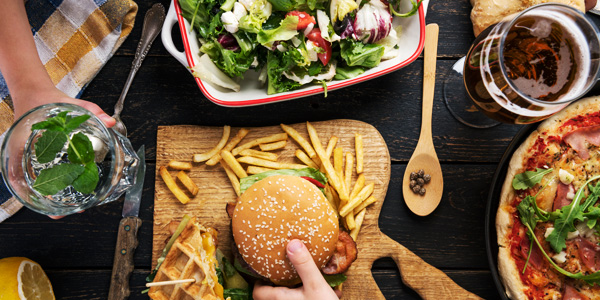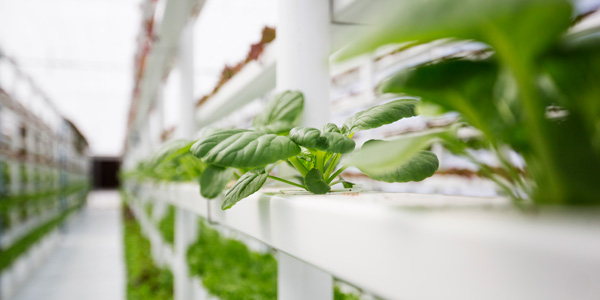INNOVATE
Latest Research/Tech
From cell to table: Four local foodtech startups
Published on 10 Nov 2018 | By Marissa Lee | Source: Business Times © Singapore Press Holdings Limited. Permission required for reproduction.
As the food industry moves towards re-engineered products that are healthier or cleaner- four foodtech startups in Singapore reveal what’s brewing in their labs.

DUMPLINGS stuffed with meat grown from fish cells in Petri dishes. Alcohol brewed from unwanted tofu whey. In Singapore- a small but growing number of startups are betting that they can change the way we eat. Their work with novel foods stems from the same concerns. It’s either the environment they’re trying to save from disrepair- or the general health of the people.
The murmurs here echo a louder movement in North America- Europe and Israel- where foodtech – the re-engineering of food to be healthier or “cleaner” while tasting just as good – has gained a following- and mainstream investors have poured millions of funds into plant-based meat companies like Beyond Meat and Impossible Foods.
Abhinav Mehra- vice-president of portfolio management at ID Capital- a Singapore-based venture investment and consulting firm- tells BT that 2018 has been a milestone for foodtech. Earlier innovations in food supply were concerned with productivity tools or how to connect farmers to markets.
“We’ve passed that phase-” Mr Mehra says.
Now we’re hearing more about how to change what’s on the table. Especially in Singapore- I’m hearing a lot of innovations geared to consumer products. I think 2019 can be a breakout year when you can see a lot more innovations hitting the shelves of 7-Eleven and Cheers- not remaining exclusive and high-value products.
Abhinav Mehra- Vice-President of Portfolio Management at ID Capital
Established firms up and down the food chain are watching the space closely. Gurpreet Singh Vohra- who helms Wilmar Ventures- the venture capital arm of agri-food giant Wilmar International- says: “There is an increasing awareness in the world that we are what we eat. That has become very clear now.
Life expectancy has increased many-fold in all markets- so for a company like Wilmar in the basic food ingredients space- it becomes very important to look at healthier protein- fibre- carbohydrates.
For serious investors- foodtech is not about digital solutions- food delivery apps or vending machines. An iPad that takes orders at a restaurant is a productivity tool- not innovation.
Foodtech is about food reformulation- using new processing technologies to improve the flavour- nutritional value or shelf life of food- and finding novel ingredients and methods that could fundamentally change food production.
Dr Rebecca Lian- a food technologist who heads the WIL@NUS Corporate Laboratory opened earlier this year- explains: “Foodtech is how you engineer food. In terms of its product design- in terms of its processing- so that you come up with a healthier- nutritious food that is sustainable and yet at the same time delighting consumers.
“For the longest time- we (the food industry) have looked at just satisfying consumers’ tastes. We forgot to address the fact that food has to be healthy as well as tasty.”
BT speaks to four foodtech startups to find out what’s brewing.
Cell-based meat

Earlier this year- two stem-cell biologists quit their jobs at the Agency for Science- Technology and Research (A*STAR) to embark on what will be a multi-year journey to put cell-based seafood on your plate.
Sandhya Sriram- co-founder of Shiok Meats- tells BT: “Once we finish our R&D in the next two to three years- the idea is to produce cell-based seafood on a large scale that can be cooked or packed into a dumpling or wanton.
Definitely we can’t make seafood look like seafood that you catch from the ocean. We can’t make the fish as a whole. Even Mosa Meats and Memphis Meats- some of the first biotech firms to focus on beef and red meat grown from animal cells instead of reared on a farm- are working on hamburgers and meatballs (minced meat).
Sandhya Sriram- co-founder of Shiok Meats
Only a handful of companies across the world are developing cell-cultured fish- Ms Sriram reckons. US-based Finless Foods said this year that it hopes to get its bluefin tuna product to achieve price parity with the real thing by the end of 2019. US-based Wild Type is working on lab-grown salmon. There are many other fish in the sea- so Shiok Meats will avoid doing duplicate work.
She adds: “Traditional research has been focused on mammalian stem cells (for cell therapy). For sea animals- the scientific literature is 20 or 30 years old. But sea animals are relatively simpler compared to complex mammals- in theory.”
How cell-based meats will be regulated remains a question. Shiok Meats will avoid using GMO (genetically modified organism) stem cells to avoid the GMO tag.
Commercial viability is also a big hurdle. In 2013- the first five-ounce hamburger comprising 20-000 thin strips of cultured cow muscle tissue cost a sweet US$325-000. Memphis Meats has said it can make a pound of meat for less than US$2-400 today.
Shiok Meats is one of Singapore's few independent biotech startups that isn’t a spin-off from a university or research institute.
In public-private partnerships- you might end up sharing your IP (intellectual property). This is something that investors worry about when you grow big. These are things that startups like us have to think about.
Ms Sriram
Novel wheys of fermentation
SinFooTech- a spin-off company from the National University of Singapore (NUS)- has patented a technology for the bio-transformation of soy whey into an alcoholic beverage they call Sachi.
Soy whey is a by-product of the tofu manufacturing process. The plan is to sell Sachi as a beer alternative by the end of 2019- as soon as SinFooTech completes experiments at commercial volumes- and finds a suitable production facility.
In Singapore- there are only a handful of companies with licences to produce non-beer alcoholic beverages. They’re expensive to obtain- and the application process can be quite lengthy. But we want to say Sachi is produced in Singapore- so we’ll be working closely with the relevant government authorities- such as Singapore Customs- to achieve our goal of creating a ‘Made-In-Singapore’ beverage that Singaporeans can be proud of.
Jonathan Ng- Chief Executive of SinFooTech
SinFooTech has other products in the pipeline as well- which all tackle the issue of sustainable food production- or how food processing by-products can be “upcycled”.
Mr Ng says: “I think the foodtech landscape is starting to grow in significance locally. NUS has a very long history of foodtech education- and we’re starting to see more initiatives to commercialise the research conducted there.”
Ice cream reformulated

Diabetics tempted by sugary treats and vexed by the lack of tasty alternatives now have a safer option. In August- a team of engineers and scientists who used to work in the healthcare industry launched Callery’s- a homegrown line of premium ice creams that contain less than a third of the calories- fat and sugar served in Ben & Jerry’s or Häagen-Dazs.
Callery’s sold more than 2-000 pints online and through FairPrice Finest in just two months- says Ow Yau Png- co-founder of homegrown startup Hoow Foods.
It took the team two years to build its proprietary foodtech platform.
Using that systematic approach to food product development- the final Callery’s ice cream prototype was completed within six months of the first conceived formulation.
Callery’s ice cream is a product by design and research- not by trial. We knew what had to go in- and what would happen when certain ingredients were used- and the experiments were streamlined and informative based on sound food science.
Ow Yau Png- co-founder of homegrown startup Hoow Foods.
Callery’s contains a natural sweetener called erythritol- which has almost no calories and is not known to cause spikes in your blood sugar levels. Erythritol is an additive approved by Singapore’s Agri-Food and Veterinary Authority (AVA)- unlike stevia- which is not permitted for use in ice cream products under the Food Regulations.
Hoow Foods is in the process of reformulating more common food products. Mr Ow says: “Unlike other industries such as IT and healthcare- we believe the best marker of success is not in the patents and depth of research- but the reach and acceptance by consumers. Consumer demands drive the industry.”
Better nutrient absorption

Eatobe- led by founder Patrina Phua and a team of three PhD scientists- wants to help your body absorb more of the good stuff in whole foods like grains- nuts and veggies- by using enzymes and bacteria to pre-process them naturally.
The team plans to roll out its first consumer products next year – affordable snack packets of Eatobe nuts- as well as Eatobe grains that are intended to be complete protein substitutes for animal-derived protein like milk and meat.
But Eatobe’s ultimate goal is to be a food ingredients supplier to big food companies like Nestlé and Mondelez that dominate food supply.
If we could get these companies to replace their grains- nuts and vegetable ingredients with ours- that would be a start.
Patrina Phua- founder of Eatobe.
Eatobe is working with three ancient grains that are overlooked and hence cheap- instead of so-called superfoods like quinoa which have been hyped up to high prices: “The farmers growing quinoa in Peru cannot even afford to eat it.”

Eatobe was incorporated in 2016- and now operates out of an A*STAR biotransformation lab under an arrangement where IP rights are co-shared.
Ms Phua says: “The food industry is exciting to me because we treat food as a vehicle to deliver preventive and therapeutic health... Whole foods are complex- we’re not just adding probiotics to food.”
Foodie nation
Singapore has set its sights on becoming a leading food and nutrition hub in Asia by 2025. Yet conversations with various industry players give the sense that Singapore’s foodtech ecosystem is small and nascent- lacking in critical mass.
Food and nutrition research and education is surprisingly lacking among Singaporeans- which is ironic given the fact that Singapore professes to be a foodie nation.
Mr Ow of Hoow Food.

“If we are to develop into a food innovation hub- we need more scientists who are passionate about disrupting the current norms in food and nutrition.”
Other entrepreneurs say that it’s difficult to find the backing they need here. Sophie’s Kitchen- a US-based foodtech firm that makes plant-based smoked salmon- had talked about moving its operations to Singapore a year ago. It no longer plans to do so.
Founder Eugene Wang tells BT: “You will find most VCs and investors here in Asia are not really enthusiastic about investing in local foodtech ventures. If the money does not flow this way- it will be hard to nurture new startups. We have problems finding money in Singapore to back up our ambitious goals.”
Culture could be another reason behind Asia’s lack of homegrown success stories. Mr Wang says: “We Asians have so much ego about our food- history- and culinary skills. It makes it really hard for new and creative ideas to be born and embraced.
“Plus- sustainability issues are only discussed among professionals and in the media. Most consumers do not really practise good sustainable behaviours. Therefore- it is hard for a foodtech ecosystem to be born anywhere in Asia- and that includes Singapore.”
This is disappointing- considering that Sophie’s Kitchen has Asian roots- literally. One of the key ingredients that gives the company’s faux seafood its texture is konjac- a Japanese yam known for its medicinal value that is also made into konnyaku jelly.
In fact- Asia’s separate food heritage from the West could be an advantage for startups here.
ID Capital’s Mr Mehra says: “There’s traditional Chinese medicine- Ayurvedic medicine. That can really add value. We don’t have to make a burger- we can have our own products. Asia has a lot of food innovation that’s really transformed the West.”
For investors- foodtech valuations here are also “far more reasonable” than in North America or Europe- he adds. ID Capital’s foodtech investments are made with private capital for now- as Mr Mehra would like to see the industry mature a bit more before he raises a fund.
In 2016- Wilmar received a S$10 million grant from the National Research Foundation to make early-stage investments in local startups focused on agtech- industrial biotechnology and future foods. To date- none of that money has been deployed.

Mr Vohra explains: “A lot of companies are doing work in areas that unfortunately will not lead to fruitful outcomes- that’s the nature of innovation... Today in the market- there are lots of healthier products in every category. But only a very small percentage of these product are repurchased. They’re not sticky because they’re not tasty.”
Consumers have also been numbed by years of conflicting research and misleading claims about the health risks and benefits of various food ingredients.
Dr Lian- a Wilmar Distinguished Fellow- says: “You need to have clinical science results behind it (your product) to demonstrate that it really works. And clinical studies are very expensive to do- so that’s the challenge.”
Food is a risky business – margins are not high and customers are lost forever if you disappoint them in taste or texture. But there are “low-hanging fruits” to be plucked- Dr Lian says.
In the preparation of cooked meals for example- something as simple as healthier cooking oil could make a big impact.
Wilmar remains open to collaboration- and has let a number of agtech startups use its estates for field tests. Mr Vohra says: “In the agtech space- there are a lot more Singapore companies.”
The pieces are slowly falling together for Singapore’s fragmented foodtech ecosystem.
In May- John Cheng- who owns sugar manufacturing and trading firm Cheng Yew Heng Candy Factory- set up Singapore’s first food incubator with a food factory licence and manufacturing facility that will be ready next year. Innovate360 is incubating six startups- and has helped three of them secure government grants so far.
Temasek Holdings has thrown its weight behind Singapore’s foodtech dream- planting the Singapore flag overseas with investments in Impossible Foods and Modern Meadow- a lab-grown leather company.
Singapore’s ministers are raising the profile of the food industry by headlining various industry events. TechInnovation- the IPI’s annual tech matching event- has also featured a food innovation track since 2017.
Being a foodtech hub is a logical pursuit for Singapore in light of the ageing population and war on diabetes- as well as from a food security and climate change perspective.

Eugene Wong- managing director of Sirius Venture Capital and an early investor in foodtech startups overseas- says: “Singapore is well suited for agri-food tech- more so than other technologies in Silicon Valley. We have the basic technology and we have a lot of money. We can try.
“At this stage- we still need to grow the expertise of managing foodtech companies. We’re not talking about research- but how to build a big foodtech company – you need to have entrepreneurs with a vision. You cannot rush that- and maybe we’ll see good quality companies in the next five to 10 years.
“But I think it’s important to create a critical mass of foodtech startups. You need some foodtech warriors to farm the concrete jungle.”
Was the article helpful?
A*STAR celebrates International Women's Day

From groundbreaking discoveries to cutting-edge research, our researchers are empowering the next generation of female science, technology, engineering and mathematics (STEM) leaders.
Get inspired by our #WomeninSTEM
